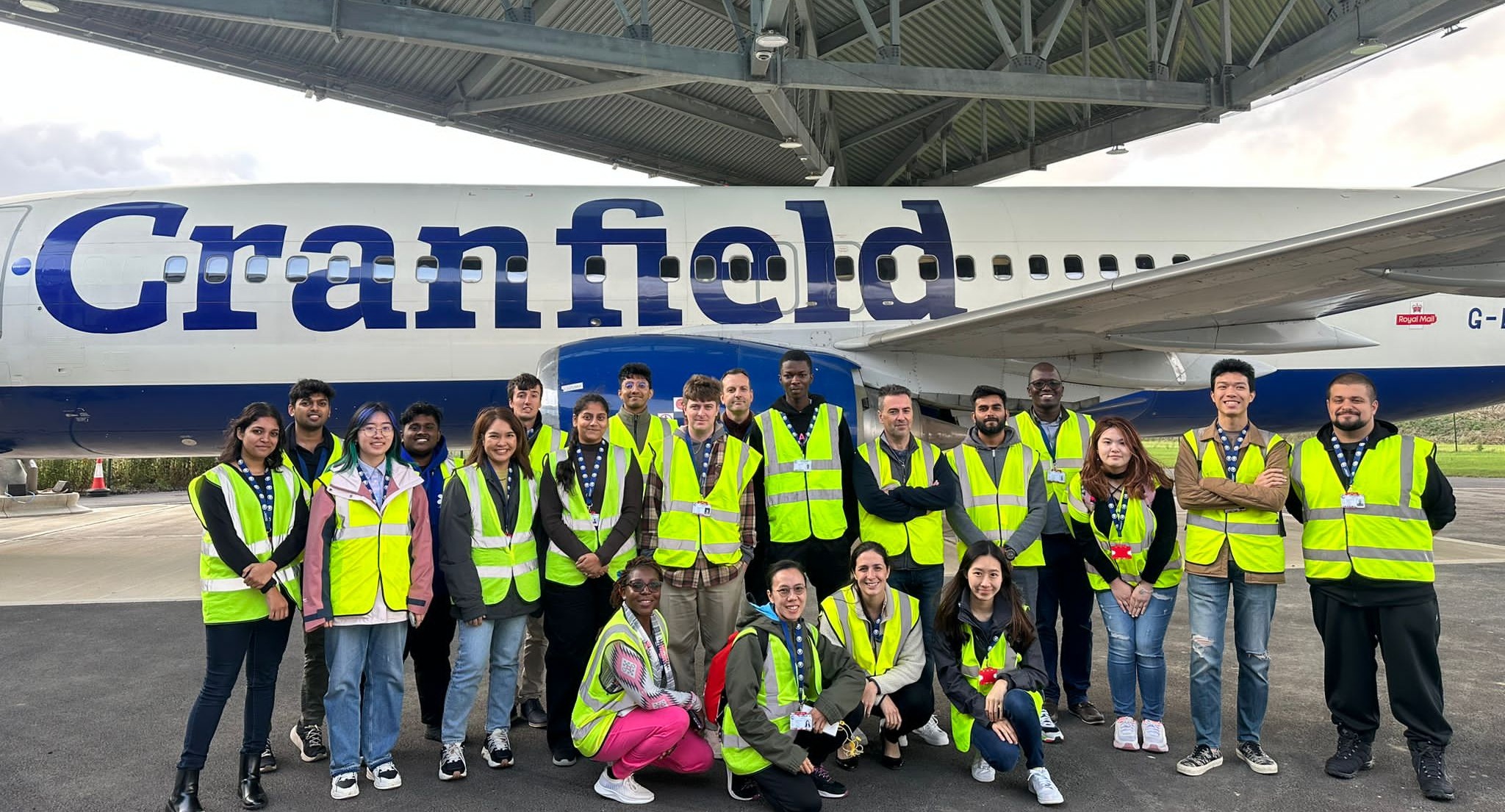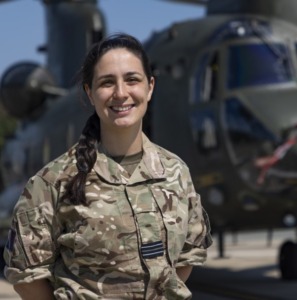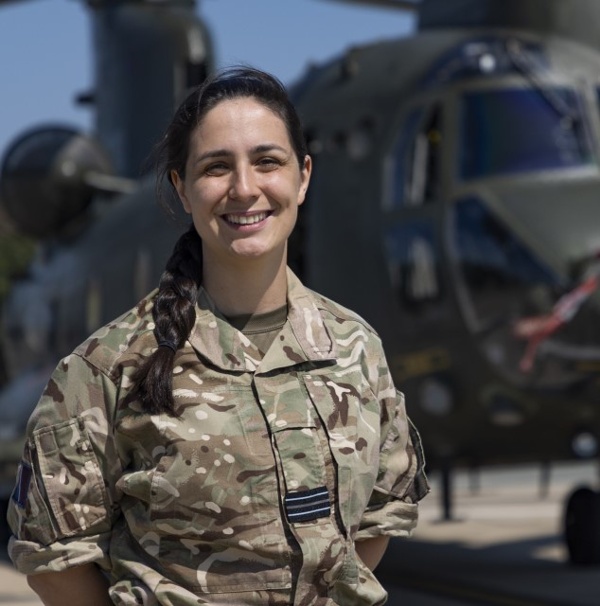Royal Air Force Officer Kathy: Why I chose to study Safety and Human Factors in Aviation MSc
29/11/2023

Growing up in Southampton with her father, an Air Cadet Instructor, Kathy had an interest in aviation from an early age and was committed to join the Royal Air Force from the age of 14.
Now 31, as a Royal Air Force Engineer Officer, Kathy shares her career journey so far and what motivated her to apply for the Safety and Human Factors in Aviation MSc.

“Growing up in Southampton, my father helped manage the local aviation museum and family holidays mostly featured air shows and aircraft museums around the world. When I saw an advertisement for an engineering school that had a pathway direct into the Royal Air Force (RAF) at age 14, I was frustrated that I had to wait another 2 years before I could apply.
“From then I was hooked. I was fortunate to get a place at Welbeck, the Defence Sixth Form College, which was established to educate and train engineers for all of the UK Armed Forces, and then to spend 4 years at Loughborough University getting a Masters degree in Aeronautical Engineering, supported by the RAF.
“I had a guaranteed place at Initial Officer Training (IOT) at RAF Cranwell and then, following my commissioning, Engineer Officer Training (EOFT) at RAF Cosford, the home of Engineering in the RAF (and the home of an excellent museum, for those who might be interested).
“Both IOT and EOFT are tough courses, designed to give Royal Air Force Officers and Engineers the tools they need to make difficult decisions, to lead and support the people under their command and ultimately to deliver air power and defend the national interest. So when I arrived at my first posting as the first Junior Engineer Officer on the new into service A400M aircraft I had to hit the ground running.
“A new aircraft brings with it many challenges, and the LXX Sqn was supported by a team of Airbus engineers who worked alongside the Royal Air Force maintenance personnel. The mix of military and civilian culture, the difficulties associated with evolving the sqn as we went, in the space of 2 years, from 8 aircraft to 20, from training crews to deploying to the Caribbean to support humanitarian efforts following the hurricanes in 2017, establishing a permanent A400 presence in the Falklands, including search and rescue operations, and the Middle East, is what sparked my interest in Human Factors and the importance of diversity of thought within our workforce.”
My motivation to study at Cranfield
“The Royal Air Force, like many Air Forces around the world, enjoys an excellent relationship with Cranfield University. Many of our continuous professional development courses are delivered by Cranfield.
“When I approached the office of Defence Studies (RAF) looking for opportunities to expand my own studies, they were more than happy to support my application through the Chief of the Air Staff Fellowship program, a tool which we use to provide opportunities across all ranks and professions to undertake education outside of the Royal Air Force as long as it can be demonstrated that it will benefit the future of the service. After a lot of hard work, last December I was informed that my application had been selected above all the other entries and that the Royal Air Force would be supporting a full year of study at Cranfield.”
Supporting outreach activities to encourage diversity
“I’ve also always enjoyed opportunities to do outreach with youth groups and organisations that support young people getting into STEM careers.
“Women are still very much in the minority in engineering in the UK, so I’ve naturally found a place speaking at events like International Women in Engineering Day, as well as visiting schools to talk about my experiences.
“The stand-out moment for me was a female student on one of our STEM camps telling me a story about how her teacher had refused to sign her application form because it was a ‘boys club’ and she ‘wouldn’t enjoy herself.’ She refused to take no for an answer and went to her headteacher instead to get support to attend the camp. I’m so proud of her for that, but it’s so sad that she had to advocate for herself and fight for something which should be available to anyone regardless of gender, ethnicity or background.
“To me, engineering is about making the world a better, safer place. It’s about coming up with new solutions, new ways of looking at the world. To do that, we need to have as diverse a group of people as possible to be part of that solution.
“We need differences of opinion and experience to put those problems into context. I know that student will be an excellent engineer because I spent all week getting to see the way she worked with others to achieve her goals, the passion she had for bringing out the best in the people around her, and I’m glad she knows that it’s not a ‘boys’ club’ anymore, and that engineering has a place for everyone.”
My experience so far at Cranfield
“It’s been a couple of months now on my Safety and Human Factors in Aviation MSc and I’m still kind of amazed that I’m here, and incredibly grateful for the opportunity.
“So far our cohort has completed two modules – Human Error and System Safety and Human Computer Interaction in Aviation. I’ve been working on my first assignment, a safety assessment of the refuelling processes for a Liquid Hydrogen fuelled aircraft, and soon we start our Cognitive Ergonomics module.
“We’ve had visits to the Digital Air Traffic Control tower, had time on the Future Systems Simulator using eye-tracking and heart monitoring technology to assess pilot workload, and organised visits to London and Cambridge to take part in Royal Aeronautical Society events.
“The most valuable thing about the course so far has been the diversity of thought, which is bred by diversity of background and experience.
We are a small cohort, with only 18 on the full-time MSc program, but we represent 15 different countries, 3 different Air Forces, and a multitude of backgrounds from Air Transport Management, Air Traffic, Engineering and Psychology.
“The subject matter is incredibly thought provoking, especially as we look into the future of how the evolving technologies, the focus on sustainability and the lean towards automation will affect aviation and the world as a whole. We’ve had some lively debates fed from our own perspectives and experiences, and I’m really excited to see what else we will get to learn from each other over the next ten months.”
Categories & Tags:
Leave a comment on this post:
You might also like…
Keren Tuv: My Cranfield experience studying Renewable Energy
Hello, my name is Keren, I am from London, UK, and I am studying Renewable Energy MSc. My journey to discovering Cranfield University began when I first decided to return to academia to pursue ...
3D Metal Manufacturing in space: A look into the future
David Rico Sierra, Research Fellow in Additive Manufacturing, was recently involved in an exciting project to manufacture parts using 3D printers in space. Here he reflects on his time working with Airbus in Toulouse… ...
A Legacy of Courage: From India to Britain, Three Generations Find Their Home
My story begins with my grandfather, who plucked up the courage to travel aboard at the age of 22 and start a new life in the UK. I don’t think he would have thought that ...
Cranfield to JLR: mastering mechatronics for a dream career
My name is Jerin Tom, and in 2023 I graduated from Cranfield with an MSc in Automotive Mechatronics. Originally from India, I've always been fascinated by the world of automobiles. Why Cranfield and the ...
Bringing the vision of advanced air mobility closer to reality
Experts at Cranfield University led by Professor Antonios Tsourdos, Head of the Autonomous and Cyber-Physical Systems Centre, are part of the Air Mobility Ecosystem Consortium (AMEC), which aims to demonstrate the commercial and operational ...
Using grey literature in your research: A short guide
As you research and write your thesis, you might come across, or be looking for, ‘grey literature’. This is quite simply material that is either unpublished, or published but not in a commercial form. Types ...







